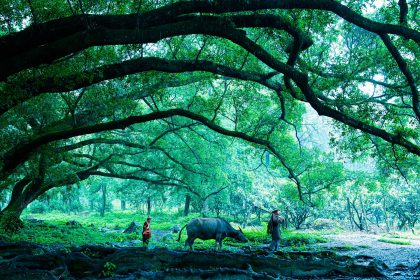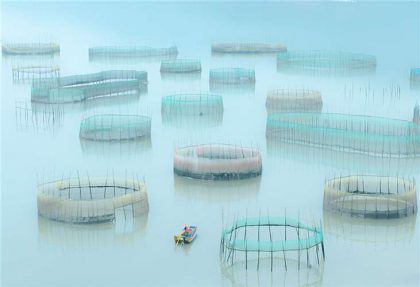
In this week’s Gold Medal Portfolio showcase, we’re highlighting students Shi Yan and Jeffrey Liao. Shi shows his appreciation for the rich culture and history of China through a series of pictures that depict the complex culture of farming there. In his writing, Jeffrey addresses his experiences as an Asian-American to unravel his feelings about identity and to grow more confident in who he is.
Shi Yan
“China is a country that has more than 5000 years of history. I was born in China and grew up there. I love this country and I also love its culture. Chinese farmers started farming thousands of years ago. Although it has developed into mechanical farming now, there are still farmers using the original way to do farming and fishing. This set of pictures is about the culture of farming in China. And I hope more people can see it.”

Jeffrey Liao
“Through writing, I have been able to reconcile aspects of my identity that I previously tried to suppress or felt ashamed of showing. Writing has taught me that my voice is just as valid as anyone else’s–that I am not a side character, a stereotype, or a quota–as society may portray me–but rather a unique human being, an individual with stories to share and a voice to use to hopefully inspire, empower, and spark change.”
In the Orchard
Poetry, Grade 12, Livingston High School, Livingston, NJ. Command Companies Writing Portfolio
When the red sun rises over the Hunan mountains,
my grandmother and I stroll barefoot through the rice fields.
The wind chases the sweat on our backs while
farmers dressed for harvest cleave the earth into pieces.
Herons fly toward the sky, singing a hymn for summer,
their white wings turned upwards for some cosmic relief
from the suffocating heat. The bruised light of dawn
kisses my grandmother’s frail body, the drooping folds of her skin
mirroring her crumbling childhood house with no windows
and no door, the straw roof infested with beetles. I touch
the battlefield of scars running down her arm, her palms gnarled
like the currents of the Yangtze. Is she thinking of her youth?
When she watched her mother’s stomach spill endlessly
into a wooden bucket, when the air was a black inferno
that burned her village to the ground?
My grandmother was twelve when she waded through
the yellow river in search of her younger brother,
bullets sailing toward her breathless body like snow.
A month later, he washed ashore on a mud-slabbed
bank, lying facedown. She couldn’t afford
tears or a funeral. Time was an inevitable thief,
stealing her livelihood until she had no choice but to run,
blisters blooming on the palms of her feet, hunger sinking its
sharp claws into the pit of her stomach. My grandmother hid with the dusk.
Drank the story of her own blood. Scaled the mountain of the war
to the place where the sun would rise.
I wonder if my grandmother sees her late brother in my eyes,
if the fish we buy at the local market reminds her
of her mother’s hollowed lips. I wonder if, on bitter winter nights,
she hears the sirens of a country fallen,
thousands of bodies littering the streets like sewage, napalm flowers
wilting in the dirt. As we pass through the shimmering green ocean of rice paddies,
the ghosts of her fingers laced in mine, I want to be
the earth and its sky and sun, clinging to the trees and the clouds
and the two of us
in a tender embrace. I want to bleed warmth into my grandmother,
to erase the fatigue from her eyes. To paint her a world where
she does not have to remember her family in the past tense.
But I am not the earth. I am just a boy, with monsoon hands
and sea-dust eyes and a soft beating heart. So instead
I plant a kiss on my grandmother’s calloused cheek,
her smile the seed and roots of an orchid,
ready to grow, to bloom upwards from the parched soil
and try again.
